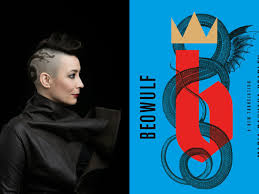
Friday – Halloween Edition
I’ve just finished Maria Dahvana Headley’s new translation of Beowulf, sent to me by reader and occasional contributor Donna Raskin, and draw upon it for a Halloween post. If this obscure Anglo-Saxon epic continues to captivate the modern imagination, I think it’s because it speaks to our continuing problem with violence. Few works in world literature surpass Beowulf’s depictions of monstrous rage.
Given that Halloween is an occasion where children use their imaginations to articulate and defang their inner fears, here’s a reminder that literature does something similar.
I’m not an Anglo-Saxon scholar and so can’t do full justice to Headley’s translation. I’m impressed, however, by how she casts the poem as a barroom tale (“Bro! Tell me we still know how to speak of kings”) and uses contemporary slang to atttract a new generation of readers. Here’s how she captures Beowulf’s initial claim:
Anyone who fucks with the Geats? Bro, they have to fuck with me.
They’re asking for it, and I deal them death.
Now, I want to test my mettle on Grendel, best him,
a match from man into meat. Just us two,
hand to hand. Sweet.
And describes the Danish queen Wealtheow:
She went round
a Helming-hostess, treading with purpose, rings shining,
beer-sounding soldiers, old and young, both of her own house
and the sea-slayer’s, goblet held to her breast. Hashtag: blessed.
And depicts Beowulf as he prepares to leap into the Grendel family’s mere:
Meanwhile, Beowulf gave zero shits.
he dressed himself in glittering gear,
his mail-shirt finely forged, links locked
and loaded. He’d meet this murdering mother
under mere, and amend her existence.
And again Beowulf as he battles Grendel’s mother:
The Geat was ready to rumble, pissed now.
When I’ve taught the poem, I’ve often described Beowulf’s interchange with Unferth upon first entering King Hrothgar’s hall as trash talk. Headley goes a step further and comes up with something we could somewhat imagine from two contemporary brawlers:
No shit, though, Unferth, if you were
the bitter-brawling brave you claim to be,
your king wouldn’t have suffered a single night
of Grendel’s rampage, no bitten bones,
no hall-horror, no chaos in his kingdom.
Grendel was aware he had nothing to fear here.
Your sword’s soft, son.
While I appreciate what Headley has done, I take issue with some of her decisions. Although most translations note where gaps exist in the original manuscript (including my favorites, Seamus Heaney’s and Burton Raffel’s), Headley glosses them over for the sake of narrative continuity. This robs the work of some suggestive power.
For instance, there’s a jump between the last veteran having retreated into his funeral barrow and the dragon discovering it. By ignoring the gap, Headley emphasizes that the two are definitely different characters.
The gap, however, gets us to look for thematic continuity—why would one incident follow the other?—and one can conclude that the poet is actually getting at what it means for a human to become a dragon. The last veteran, in other words, has experienced a spiritual rather than a literal death.
In this regard, he resembles any number of kings in the epic: the bad king Heremod (who jealously hoards his treasure from his men at the end of his life), Danish king Hrothgar (who wants to give up after losing his best friend to Grendel’s mother), Geat king Hrethel (who retreats into his bed and never recovers after losing a son), and even Beowulf (who towards the end looks back over his life and sees only one senseless death after another). Beowulf’s last battle, in other words, can be seen as an old man struggling with his own depressive tendencies.
In any event, Headley’s translation will make the work fresh to certain readers, which is all to the good. In the spirit of the holiday–or hallowed day–here’s an appropriately horrific passage. In it, Beowulf informs us what will happen if Grendel wins:
When we see who wins,
we’ll know who’s got God’s favor.
If it’s Grendel—I’ll be a mere chapter
in his gory story. He’ll feast on Geats,
ripping my men limb from limb,
and I won’t be there to protect them.
I’ll be dead, too, cheekbones chewed
and face forgotten, my body dragged
to his lair, where he’ll fare alone on my
severed head, make a banquet of my flesh,
he and I, alone again, naturally…
Horrors happen, I’m grown, I know it.
Bro, Fate can fuck you up.
Happy Halloween!
Previous Halloween Posts
Check out the Bard for Halloween
The Ancient Mariner as a Halloween Poem
Pinocchio, A Horror Story
Putin as Murakami’s Boris the Manskinner
Hurricane Sandy: Hell Is Empty and All the Devils Are Here

